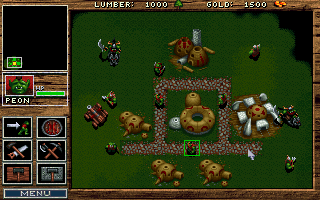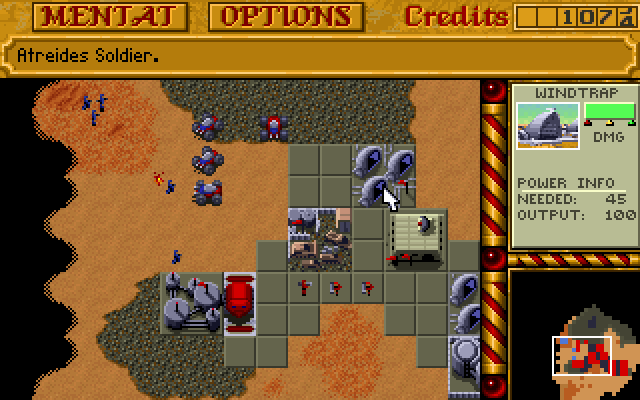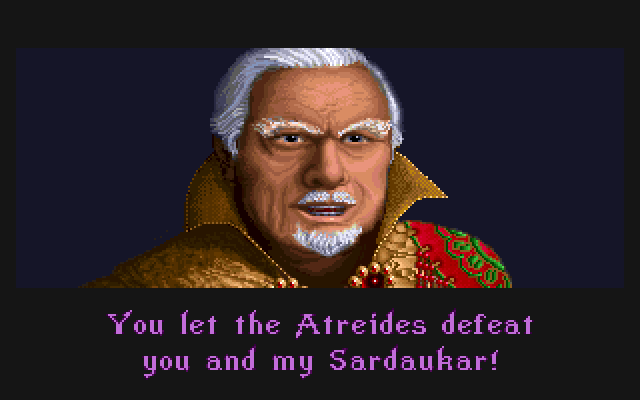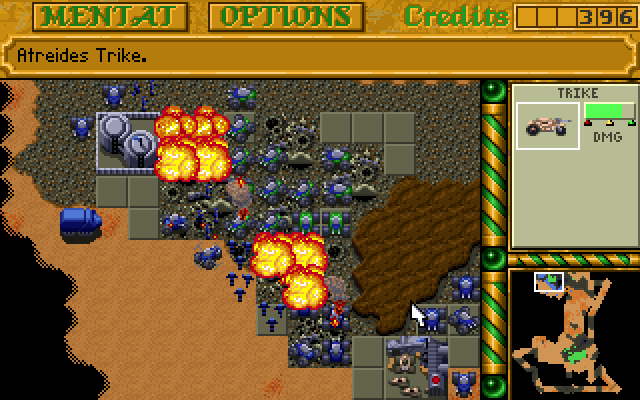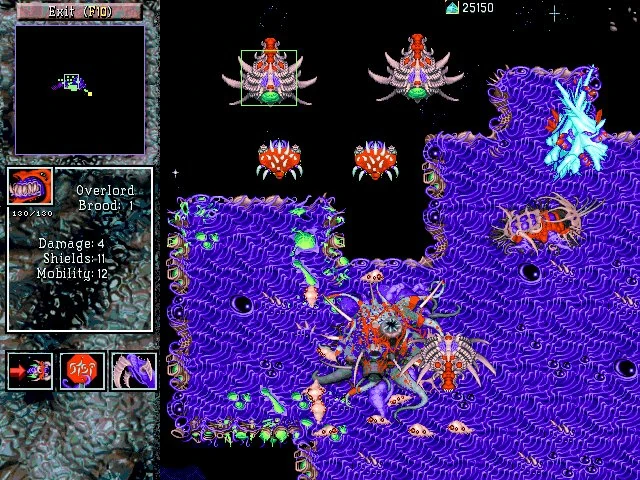For reasons I don't even entirely remember (just generally musing about old RTSs), I felt compelled to load up Warcraft 2 and just... click around. Then I thought "No, I should play Warcraft 1". In my mind, Warcraft 1 is exactly like Warcraft 2, just without all the ships and boats, but my mind likes to lie to me.
Instead it is some weird Game Gear ass looking game with even less options, road requirements for buildings, and... surprisingly a lot of neutral units(Oh Ogres?? I get to build Ogres like in WC2??? Oh.. oh wait no...)?
It's a strange game, with clunky, limited controls. You can only select 4 units at a time. I didn't even realize Drag Select existed for hours until I found it required holding down ALT. The roads seem bizarre until you see the source material it's coming from. It's a miserable game where everything is slow and tedious and you barely have the control the necessary to do what the game is asking of you. While more sophisticated than anything(... Maybe, who knows what weird games are out there) that came before it, it felt like it was inadequate at meeting the designers vision of the game. Warcraft 2 fairs better, but still had relatively limited unit selection, while lacking things like control groups(If you're like 'I swear WC2 had Control Groups' it's because you were playing Battle.net Edition). Warcraft 2 is a better game. It's a fine game... but it's not great. Sluggish in controls, with units that are like dry, unseasoned chicken. Both are MILES away from Blizzard's breakout Starcraft, which feels like a complete package.
This made me curious about Dune II, the predecessor of all RTSs. If these two games games were so archaic and hard to control, surely I should take 5 minutes to click around Dune II, just to compare. Just a mission or two...
So then I beat Dune II
Sometimes worse things are better.
Dune II was indeed more primitive. Single unit selection only. Every command, to every unit, had to be given directly. Managing 5 units in a combat situation became a monstrous logistic task. Yet somehow this was better. Like moving from Tony Hawk, to simulationist games like Skate and Session, sometimes it's more fun when doing a simple kickflip is hard. The difference between Dune II and Warcraft 1, is Dune II asks more from you to control your force and build your base, but asks less of you tactically. Not that there are less tactics, but almost ironically but decreasing the fidelity of command, executing "simpler" tactics is more rewarding. You are, frustratingly and beautifully, more immersed in the glory and challenges of commanding an army.
What also helps in Dune II, by the nature of being Dune, it's fucking weird. We always underestimate the creativity and insight possessed by those who create the first works in any genre. Dune II is no exception. It isn't satisfied with the fantasy of commanding units around in real time. Instead you are mining the Spice, you are trying to keep your harvesters safe from fucking Sandworms. Armies get consumed by Shai-Hulud when you aren't paying attention to worm-signs. Carry-Alls and Ornithopter operate on their own accord, setting their own priorities. Carry-Alls will move harvesters around, save them from worms, move units to and from repair facilities, all without you being able to tell them a damn thing. You build them and then trust them to be useful and they are. They know how to do their job! Hell, even the House Atreides specialty unit, the indigenous Fremen, cannot be controlled. You are not the Muad'Dib, just his ally. They will assist you, but at their own discretion. Using them feels like a true guerrilla insurrection, self sufficient bands roaming the map, accomplishing their own goals, stepping on your toes often in the process, but ultimately bring victory by sheer numbers and tenacity.
This isn't just a skin on an RTS game, this is an opinionated world where the rules are weird, where you're driving a trike down the desert dunes, making a sandworm chase you, just so it doesn't eat your harvesters. Then you run into a spice vein, causing a spice bloom that destroys your unit in the process. This is a game where you should build foundations for your buildings, as they protect buildings from the environment, reducing the constant damage everything takes just from being on Arrakis. This is a place where the sand is fucking scary. You can only build on rocky outcrops on the map, because to do anything else would be deadly. This ends up severely limiting how you can build. The world is hostile to your existence on it. The sand does not care for the wars of man, and the worms care more than you'd like.
What's also funny is how deeply Command & Conquer it is. I didn't realize it was a Westwood game. I assumed both Westwood and Blizzard were biting off of someone else, some RTS version of Xerox PARC. But you have construction yards, you have harvesters that make C&C's tiberium suddenly make sense, you have C&C building... but it feels more interesting to build a new construction yard not because you want a new mining location (though you might), but because you simply need more room! Hell, you even have the map select 'choose your battle' screens.
Like all C&C games, despite all the fun, weird options, the real strategy often comes down to building lots of heavy tanks and missile launchers... but the way you have to plan, control, and carefully encroach on well protected positions is weird and engaging. You can't just outmuscle the enemy.
Even the limitations of the AI work out. All it can do is bee-line toward you. Many maps have little scripted ambushes and events to try and hide this, but most of your battles will come from one direction, so you mercifully have a front. Then you can move, flank and attack. Missions have you build for stability, creating defenses that can hold off attacks without micro management, which then allows you the mental energy to start moving units around for an offensive.
Sieging a base is slow. Turrets are strong. Taking them down safely is a challenge. Spice and the money it generates is limited. You don't have the space or resources for huge macro production facilities. Units are valuable. You don't want to just attack-move units into hostile territory. You want to keep formation. You creep up. You surround. You pull them apart, methodically.
This is also a game without multiplayer component so a lot of the balance gets to be a little weird. Some buildings, like the Starport, seem purely as a player Win Condition. The Starport is an alternative way to buy units, where they get delivered in bulk. You pay a bit of a premium, but they can break the game's unit limit, allowing you to amass a huge force for a final push... assuming you can manage it all.
The game is a bit repetitive. There are no alternative mission objectives, just a series of 'destroy this base' maps, all while you learn to deal with more and more sophisticated enemies. I felt no need to replay it as the other two houses, which both have, from what I understand, the same mission structure. Despite this, I would play it again before I would finish Warcraft 1. It's not fighting against its limitation to achieve a sterile fantasy wargame. It's aligned with its limitations, and is using them to make something fun, cool and a weird.
I wouldn't recommend Dune II for most people, but if you like weird old crusty games with real texture, it's real as hell.
Re-evaluating our Revisionist Blizzard History
They say history is written by the winner, but I don't think that's the case here. History is written by the fans of the winner. Here, I feel like many of us ended up, to use an FGC comparison, looking at Blizzard as the Capcom of RTSs. Westwood, for their part, wasn't even the SNK. They were the Mortal Kombat. Style over substance. I imagine other people, in other circles have slightly different takes on this, but I think we all, to some extent, over inflate the Blizzard of the 90s.
This inflation doesn't align with reality though. Simply looking at the states of these companies at the time puts a lot in perspective. Westwood was a long time publisher of PC games, often weird and genre bending ones. Even before Dune II, their Mechwarrior games approached the concept as almost pseudo RTSs. They were veterans.
Blizzard of the 90s was not the Blizzard of today. There were no "AAA" Blizzard games. Blizzard was a young company that often made trash to survive. They made bad racing games, they made Justice League Task Force! When they had resources, they tried to copy successful games with their own little twists added on(who would do something like this surely not me). Their best games before WC1 were Lost Vikings and fucking Blackthorne. Warcraft 1 and 2 were not overly ambitious games. They were games meant to be good enough. Games they surely took pride in, and games that were successful... But they weren't whatever "90s AAA" would be. They didn't even trust themselves like Westwood did to differentiate their races.
Their canceled original version of Starcraft basically confirms this. They weren't thinking big, they were thinking "survival". WC1 and 2 were what finally even gave them the Economic freedom to start doing what they want to do. As this article says.
The fundamental problem was that StarCraft wasn’t envisioned as a triple-A game; it was intended to fill a hole in Blizzard’s development schedule so that the company would ship a game in 1996 and thereby continue to generate revenues
This is not the Blizzard who had the bank to take their time making any game of their choosing. This is the Blizzard that had to push out product to survive. Only through the success of Diablo and having their original Starcraft demo be embarrassed by a game that... wasn't even real at the time, did they end up giving it their all to make something crazy good, though motivated by the same goals of WC1 and 2... Try to create a more cinematic and adventurous war experience.
Meanwhile Westwood almost did the opposite. Their initial design goals for C&C seemed to be "Dune was way too slow". They went turbo. They weird weird with units, and super weapons, and weird interactions, but never really found focus. They fell into a rut, where Blizzard broke out. They never quite found a way to modernize the weirdness of Dune II(I WILL NOT TALK ABOUT DUNE 2000). In a weird way, Starcraft was the cultural end of the RTS, its prominence as a genre doing nothing but fall from there. While games exist before and after them, Dune II and Starcraft are bookends for the glory days of a genre. In a lot of ways, it's the same cycle Fighting Games had(Down to me not talking about games like Total Annihilation as if it's Guilty Gear or something). Sadly Starcraft 2 never managed to be the genre's Street Fighter 4. Instead of revitalizing the genre, it was like a farewell.
... Anyways I'm off to finish replaying Broodwar because I can't stop making mistakes.

